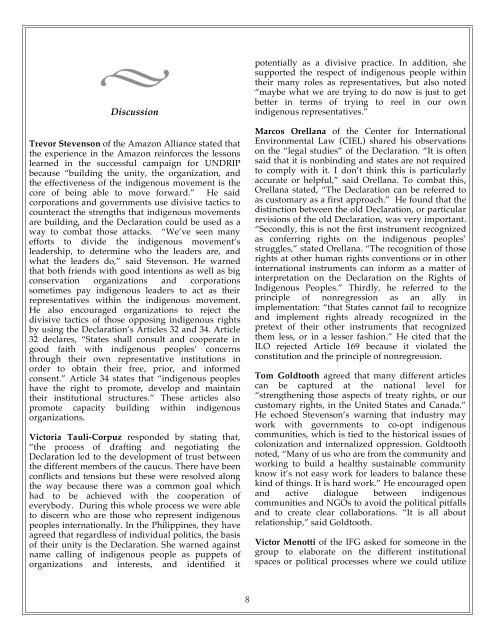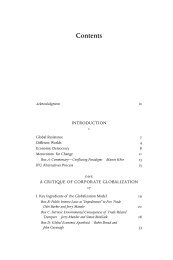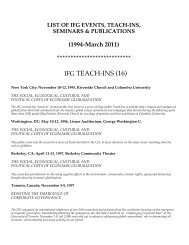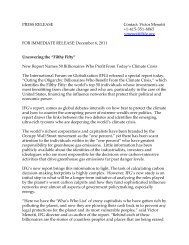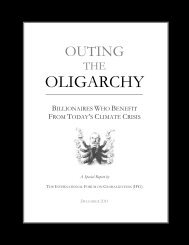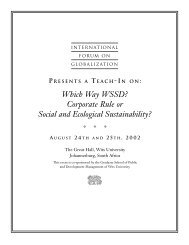UNDRIP Report - English FINAL - International Forum on Globalization
UNDRIP Report - English FINAL - International Forum on Globalization
UNDRIP Report - English FINAL - International Forum on Globalization
Create successful ePaper yourself
Turn your PDF publications into a flip-book with our unique Google optimized e-Paper software.
Discussi<strong>on</strong><br />
Trevor Stevens<strong>on</strong> of the Amaz<strong>on</strong> Alliance stated that<br />
the experience in the Amaz<strong>on</strong> reinforces the less<strong>on</strong>s<br />
learned in the successful campaign for <str<strong>on</strong>g>UNDRIP</str<strong>on</strong>g><br />
because “building the unity, the organizati<strong>on</strong>, and<br />
the effectiveness of the indigenous movement is the<br />
core of being able to move forward.” He said<br />
corporati<strong>on</strong>s and governments use divisive tactics to<br />
counteract the strengths that indigenous movements<br />
are building, and the Declarati<strong>on</strong> could be used as a<br />
way to combat those attacks. “We’ve seen many<br />
efforts to divide the indigenous movement’s<br />
leadership, to determine who the leaders are, and<br />
what the leaders do,” said Stevens<strong>on</strong>. He warned<br />
that both friends with good intenti<strong>on</strong>s as well as big<br />
c<strong>on</strong>servati<strong>on</strong> organizati<strong>on</strong>s and corporati<strong>on</strong>s<br />
sometimes pay indigenous leaders to act as their<br />
representatives within the indigenous movement.<br />
He also encouraged organizati<strong>on</strong>s to reject the<br />
divisive tactics of those opposing indigenous rights<br />
by using the Declarati<strong>on</strong>’s Articles 32 and 34. Article<br />
32 declares, “States shall c<strong>on</strong>sult and cooperate in<br />
good faith with indigenous peoples’ c<strong>on</strong>cerns<br />
through their own representative instituti<strong>on</strong>s in<br />
order to obtain their free, prior, and informed<br />
c<strong>on</strong>sent.” Article 34 states that “indigenous peoples<br />
have the right to promote, develop and maintain<br />
their instituti<strong>on</strong>al structures.” These articles also<br />
promote capacity building within indigenous<br />
organizati<strong>on</strong>s.<br />
Victoria Tauli-Corpuz resp<strong>on</strong>ded by stating that,<br />
“the process of drafting and negotiating the<br />
Declarati<strong>on</strong> led to the development of trust between<br />
the different members of the caucus. There have been<br />
c<strong>on</strong>flicts and tensi<strong>on</strong>s but these were resolved al<strong>on</strong>g<br />
the way because there was a comm<strong>on</strong> goal which<br />
had to be achieved with the cooperati<strong>on</strong> of<br />
everybody. During this whole process we were able<br />
to discern who are those who represent indigenous<br />
peoples internati<strong>on</strong>ally. In the Philippines, they have<br />
agreed that regardless of individual politics, the basis<br />
of their unity is the Declarati<strong>on</strong>. She warned against<br />
name calling of indigenous people as puppets of<br />
organizati<strong>on</strong>s and interests, and identified it<br />
potentially as a divisive practice. In additi<strong>on</strong>, she<br />
supported the respect of indigenous people within<br />
their many roles as representatives, but also noted<br />
“maybe what we are trying to do now is just to get<br />
better in terms of trying to reel in our own<br />
indigenous representatives.”<br />
Marcos Orellana of the Center for <str<strong>on</strong>g>Internati<strong>on</strong>al</str<strong>on</strong>g><br />
Envir<strong>on</strong>mental Law (CIEL) shared his observati<strong>on</strong>s<br />
<strong>on</strong> the “legal studies” of the Declarati<strong>on</strong>. “It is often<br />
said that it is n<strong>on</strong>binding and states are not required<br />
to comply with it. I d<strong>on</strong>’t think this is particularly<br />
accurate or helpful,” said Orellana. To combat this,<br />
Orellana stated, “The Declarati<strong>on</strong> can be referred to<br />
as customary as a first approach.” He found that the<br />
distincti<strong>on</strong> between the old Declarati<strong>on</strong>, or particular<br />
revisi<strong>on</strong>s of the old Declarati<strong>on</strong>, was very important.<br />
“Sec<strong>on</strong>dly, this is not the first instrument recognized<br />
as c<strong>on</strong>ferring rights <strong>on</strong> the indigenous peoples’<br />
struggles,” stated Orellana. “The recogniti<strong>on</strong> of those<br />
rights at other human rights c<strong>on</strong>venti<strong>on</strong>s or in other<br />
internati<strong>on</strong>al instruments can inform as a matter of<br />
interpretati<strong>on</strong> <strong>on</strong> the Declarati<strong>on</strong> <strong>on</strong> the Rights of<br />
Indigenous Peoples.” Thirdly, he referred to the<br />
principle of n<strong>on</strong>regressi<strong>on</strong> as an ally in<br />
implementati<strong>on</strong>: “that States cannot fail to recognize<br />
and implement rights already recognized in the<br />
pretext of their other instruments that recognized<br />
them less, or in a lesser fashi<strong>on</strong>.” He cited that the<br />
ILO rejected Article 169 because it violated the<br />
c<strong>on</strong>stituti<strong>on</strong> and the principle of n<strong>on</strong>regressi<strong>on</strong>.<br />
Tom Goldtooth agreed that many different articles<br />
can be captured at the nati<strong>on</strong>al level for<br />
“strengthening those aspects of treaty rights, or our<br />
customary rights, in the United States and Canada.”<br />
He echoed Stevens<strong>on</strong>’s warning that industry may<br />
work with governments to co-opt indigenous<br />
communities, which is tied to the historical issues of<br />
col<strong>on</strong>izati<strong>on</strong> and internalized oppressi<strong>on</strong>. Goldtooth<br />
noted, “Many of us who are from the community and<br />
working to build a healthy sustainable community<br />
know it’s not easy work for leaders to balance these<br />
kind of things. It is hard work.” He encouraged open<br />
and active dialogue between indigenous<br />
communities and NGOs to avoid the political pitfalls<br />
and to create clear collaborati<strong>on</strong>s. “It is all about<br />
relati<strong>on</strong>ship,” said Goldtooth.<br />
Victor Menotti of the IFG asked for some<strong>on</strong>e in the<br />
group to elaborate <strong>on</strong> the different instituti<strong>on</strong>al<br />
spaces or political processes where we could utilize<br />
8


